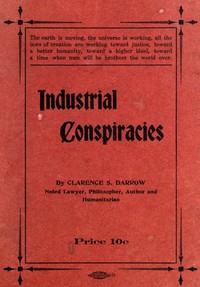Industrial Conspiracies by Clarence Darrow
"Industrial Conspiracies" by Clarence Darrow is a thought-provoking lecture delivered in the early 20th century, specifically in 1912. This work serves as a critical examination of the legal and societal implications surrounding labor and capitalist structures during that era. The primary focus of the book centers on the concept of industrial conspiracies, particularly how the law has historically been applied against working-class individuals and movements, while those in power frequently escape accountability.
In this lecture, Darrow passionately argues that the laws governing labor and conspiracy are often skewed against workers, labeling their collective actions as conspiracies while allowing the wealthy and corporate entities to operate unchecked. He reflects on historical contexts, such as the enforcement of conspiracy laws in England and the application of the Sherman Anti-Trust Act in America, emphasizing how these have predominantly served the interests of capitalists rather than those of laborers. Throughout, he highlights the struggles of the working class, their efforts to organize, and the systemic hurdles they face from both legal institutions and economic structures, positing that true justice and equity can only emerge from a significant transformation of societal norms and processes. (This is an automatically generated summary.)
Read or download for free
| How to read | Url | Size | |||
|---|---|---|---|---|---|
| Read now! | https://www.gutenberg.org/ebooks/30731.html.images | 89 kB | |||
| EPUB3 (E-readers incl. Send-to-Kindle) | https://www.gutenberg.org/ebooks/30731.epub3.images | 172 kB | |||
| EPUB (older E-readers) | https://www.gutenberg.org/ebooks/30731.epub.images | 171 kB | |||
| EPUB (no images, older E-readers) | https://www.gutenberg.org/ebooks/30731.epub.noimages | 89 kB | |||
| Kindle | https://www.gutenberg.org/ebooks/30731.kf8.images | 213 kB | |||
| older Kindles | https://www.gutenberg.org/ebooks/30731.kindle.images | 202 kB | |||
| Plain Text UTF-8 | https://www.gutenberg.org/ebooks/30731.txt.utf-8 | 80 kB | |||
| Download HTML (zip) | https://www.gutenberg.org/cache/epub/30731/pg30731-h.zip | 167 kB | |||
| There may be more files related to this item. | |||||
Similar Books
About this eBook
| Author | Darrow, Clarence, 1857-1938 |
|---|---|
| LoC No. | 12024931 |
| Title | Industrial Conspiracies |
| Note | Reading ease score: 73.9 (7th grade). Fairly easy to read. |
| Credits |
Produced by Bryan Ness, Ritu Aggarwal and the Online Distributed Proofreading Team at https://www.pgdp.net (This file was produced from images generously made available by The Internet Archive/American Libraries.) |
| Language | English |
| LoC Class | HD: Social sciences: Economic history and conditions, Production |
| Subject | Justice, Administration of -- United States |
| Subject | Working class -- United States |
| Category | Text |
| EBook-No. | 30731 |
| Release Date | Dec 21, 2009 |
| Most Recently Updated | Jan 5, 2021 |
| Copyright Status | Public domain in the USA. |
| Downloads | 120 downloads in the last 30 days. |
| Project Gutenberg eBooks are always free! | |


